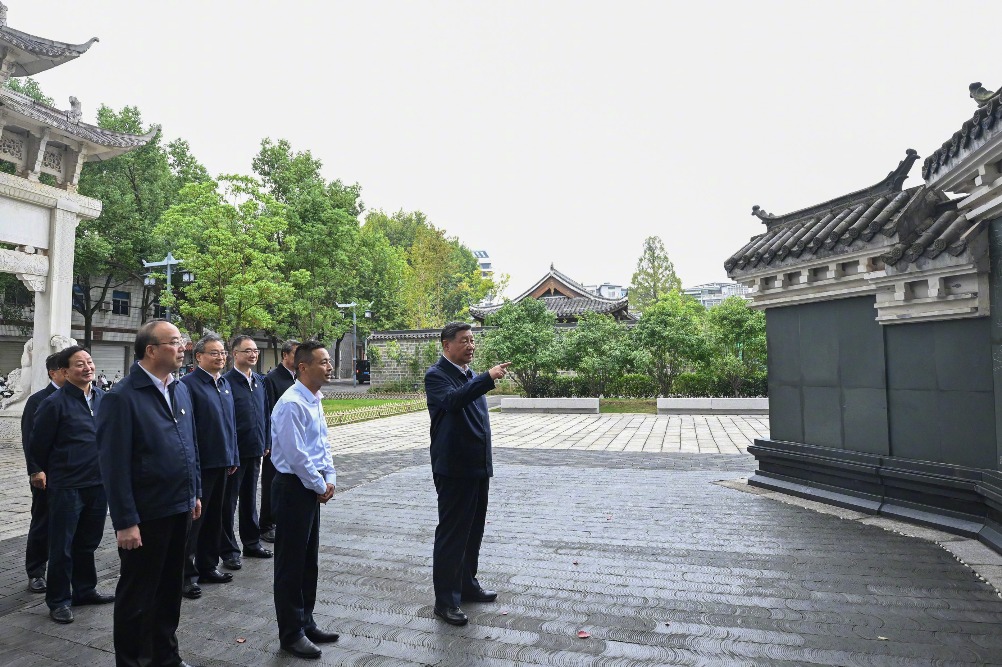Massive corporate harvest awaits reaping

Foreign investors can gain big time by making use of improved business environment
Foreign investors eyeing China, and those already operating in the country, will find the business environment increasingly friendlier and healthier going forward, industry leaders said.
Business leaders said the government's new measures that weigh foreign investment in the context of national security and industrial security will help foreign investors better understand investment boundaries in China and boost business efficiency.
Their comments refer to China's new measures unveiled on Dec 19 that heralded clarity of purpose, solid policy foundation and a reassurance that projects aligned with national security and other national goals will find tremendous opportunities to thrive in the humongous domestic market.
China, experts said, is on its way to building a more advanced, transparent and international rule-based business environment for global companies. Such an environment will be sustained over the long-term and anchor the country's economic growth, they said.
The new rules comprising 23 clauses take effect on Monday. Their legal basis is the Foreign Investment Law and the National Security Law.
They will boost China's higher-level opening-up and facilitate the new growth paradigm, the Ministry of Commerce said in a statement.
Business executives said the new measures should not cause any concern as they focus on review of specific investment projects and as such would not have any adverse impact on most overseas investors.
Under the new rules, only those foreign investments that are related to sensitive sectors-the military-related supplies, important agricultural products, important energy and resources, critical equipment manufacturing, major infrastructure, important transport services, important cultural products and services, key technologies and other important fields affecting China's national security-will be subject to security review.
Business activities resulting in acquisition of effective control over enterprises in sectors identified as sensitive will also be subject to the security review.
However, the measures will have no or negligible impact on foreign investors engaging in manufacturing, services and other sectors dominated by wholly foreign-funded enterprises or joint ventures, said Song Xujun, global partner of the United States-based Kearney Strategy Consultants.
"With national security boundaries for foreign investment defined by the new measures, foreign investors can clearly understand relevant information and better engage in business investment and operations with reference to national security. This move will effectively minimize investment losses caused by lack of transparency or clarity in information," he said.
Song further said the new policy clarifies the security review process for foreign investment, which will enhance the overall transparency and efficiency of review. It also clearly defines the three stages of the security review and the time duration required for each stage. This will significantly improve the transparency and timeliness of the review process.
"This helps resolve problems, if any, quickly for foreign investors, indicating higher facilitation of foreign investment in China."
The measures provide for more detailed procedures and requirement on security review of foreign investment, both direct and indirect, vis-a-vis the old security review mechanism promulgated in 2011, said Bridge Zhao, vice-president and general counsel for Asia-Pacific at the United Kingdom-based Smiths Group, an industrial goods manufacturer with 23,000 employees across operations in 55 countries and regions.
Over the past decades, the cumbersome "approval and filing" processes for foreign investment in China have been significantly simplified as a result of further opening up of the domestic market and China's entry into the World Trade Organization, Zhao said.
After 40 years of reform and opening-up, ensuring national security and industrial security in fields like aviation and energy has become one of the top concerns. Economic benefit alone cannot be the prime goal. For instance, the merger control review under the Anti-Monopoly Law has proved to be another effective legal tool, he said.
Even though China's Foreign Investment Law has established a negative list in its administrative regime for managing foreign investment in order to expand and diversify foreign investment opportunities, the government's security review mechanisms certainly require improvement to protect national security and better align with international regulations, said Gavin Guo, international partner of the Shanghai-based Kewei Law Firm.
A negative list determines which economic activities are prohibited, while all others are considered open to foreign investment.
In comparison with the Foreign Investment Risk Review Modernization Act adopted by the United States, the Foreign Direct Investment Regulation and Foreign Investment Reform used in the European Union and Australia, respectively, it is common for countries to carry out security reviews on foreign investment that affects or may affect national security, according to information provided by the Ministry of Commerce.
"The measures streamline the security review process and establish a new, comprehensive mechanism, which is in line with practices in other major jurisdictions," Guo said, noting the new security review mechanism takes into account both practical experiences from the previous administrative system and national security reviews internationally.
Because the new measures simplify the review procedures and timelines as compared to the previous management methods, the increased efficiency and more predictable outcomes expected under the new mechanism are likely to have a positive impact on foreign investment in China, attracting greater foreign investor interest, he said.
Thanks to China's continuously improving business environment, an efficient supply chain, competitive talent pool and 5G infrastructure for innovation, as well as its massive market size, foreign direct investment in China increased by 4.1 percent year-on-year in dollar terms to $129.47 billion in the first 11 months of 2020, according to the Ministry of Commerce.
"As China has been underlining further opening-up, in particular after signing the Regional Comprehensive Economic Partnership agreement with 14 partners in November and completing in-principle talks on an advanced investment treaty with the European Union last month, it is well prepared in many industries, such as the opening up of the financial services sector," said Wei Jianguo, vice-chairman of the China Center for International Economic Exchanges.
While many global economies are still trying new measures to tackle the spread of the pandemic, create jobs and boost exports, China is one of the few places that have kept global companies afloat, he said.
Unlike many economies, China has faced manageable supply chain risks as it was increasingly less reliant on manufacturing FDI in 2020, he said.
Tan Lee Lee, head of China at SBA Stone Forest, a Singapore-headquartered corporate advisory and public accounting group, said with the continuous growth of the Chinese economy, the implementation of the new measures, among other foreign investment frameworks, is timely as it brings greater clarity to foreign investments expanding into China.
"With the goal of setting the policy foundation right, the measures will enhance the transparency, predictability, effectiveness and efficiency of foreign investment security review to create a healthier foreign investing environment, one of the fundamentals necessary for the overall healthy economic growth in China," she said.
In the face of the global economic downturn and a shrinking international market caused by factors such as the COVID-19 pandemic, China has continued to push domestic growth via the dual-circulation development pattern, in which the domestic market is the mainstay and the domestic and foreign markets complement each other.
Therefore, attracting more foreign investments to China is paramount to this growth strategy, in order to create more momentum of conducting cross-border business, employment and talent cultivation, she said.
Despite the broad challenges of COVID-19, about 82 percent of British companies have cited China's market potential as a reason to increase investment in the country this year, according to a survey released by the British Chamber of Commerce in China last month.
Matthew Margulies, vice-president of China operations for the US-China Business Council, said US companies are optimistic about their growth in China over the next several years.
Considering that China has successfully controlled the pandemic and many economies have reported slow growth, more global companies will look for growth opportunities across the country, he said.
As the World Bank updated its projection for China's 2021 economic growth in December, which is set to accelerate to 7.9 percent, up 1 percentage point from its forecast in June, foreign investors that had been in China will continue to enjoy the benefits of economic growth, Tan said.
Foreign companies entering China will draw encouragement from the diversity and large marketplace for business in the country.
Driven by urbanization and changes in lifestyle of a more affluent population, the domestic market will continue to progress with continued demand for foreign goods, she said.
























